blogs.fco.gov.uk

Digital Communications, Press and Public Affairs Officer, British Embassy Ankara
Guest blogger for
Part of Digital Diplomacy
Many of us have had second-hand cars that take that long to get from 0 to 50! But add a “K” to the 50 and you have a description of the British Ambassador to Turkey, Richard Moore’s Twitter journey since he arrived in Turkey in January 2014. Richard was recently proclaimed by Turkey’s biggest selling daily newspaper Hurriyet as one of 2016’s top 3 users of social media. (https://twitter.com/UKAmbRichard/status/816328138368176128 )
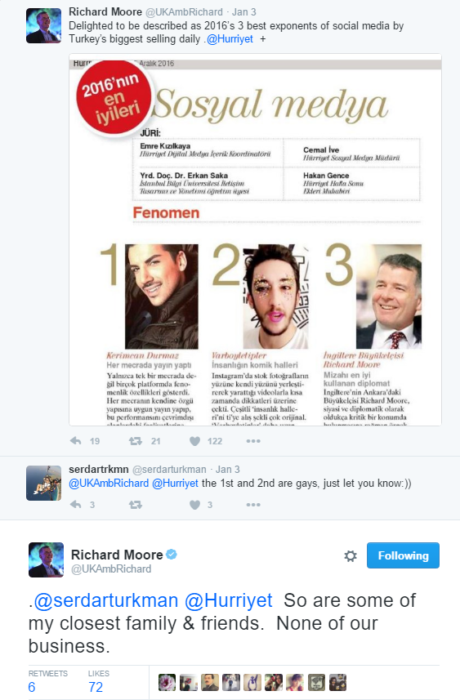
Such success is a team effort. Our starting point in 2013 was the British Embassy Ankara corporate account which – with fantastic guidance from the FCO’s Digital Hub – helped the Embassy communications team to discover the potential, power and impact of social media use in public relations and public diplomacy. We realised that social media wasn’t just a nice way to spend spare time, an interesting hobby or a place to chat with random strangers. Our UKinTurkey channels on both Twitter and Facebook gave us a real sense of the necessity and power of “tweeting” and “sharing” information during the crises that are a regular feature of Turkey’s “interesting times”.
We were helped by having a social media ninja in Leigh Turner, the UK’s Consul General in Istanbul. He started the ball rolling by showing what you could do with the right mix of the personal and the professional to build a following. The key to success online is to offer a balanced diet. A restricted diet of stodgy policy announcements, or statements plus photos of meetings, don’t work.
Richard arrived in January 2014 and, to help get him started, we set up the Twitter account @UKAmbRichard a few weeks before he arrived in Ankara. @UKinTurkey was his first follower!
So how did we get from 0 to 50k? We took a strategic and planned approach. We knew that just “being” an Ambassador online would not build a following and allow us to project UK influence through Twitter. Luckily, we had an Ambassador who wasn’t afraid to show his personality and, especially, his sense of humour. You need to be “real” and accessible on social media. Twitter, in particular, is a dialogue not a broadcast. So it was important that Richard had the courage to be criticised and patience to reply – sometimes to even the most irrational or obscure inquiries – with a polite and respectful tone. Usually, that is. Some trolling is so bizarre or aggressive that mockery is the best way to undermine its impact. And repartee and the ability to counter-punch is a vital part of doing battle on Twitter with anti-British sentiment.
Some of Richard followers sometimes (rather sweetly) express concern that his precious time is being taken up giving rational answers to irrational questions by Twitter trolls. But he argues that “humour is the most powerful tool in responding to irrational conspiracy theories.” (https://twitter.com/UKAmbRichard/status/735063687887736832 )
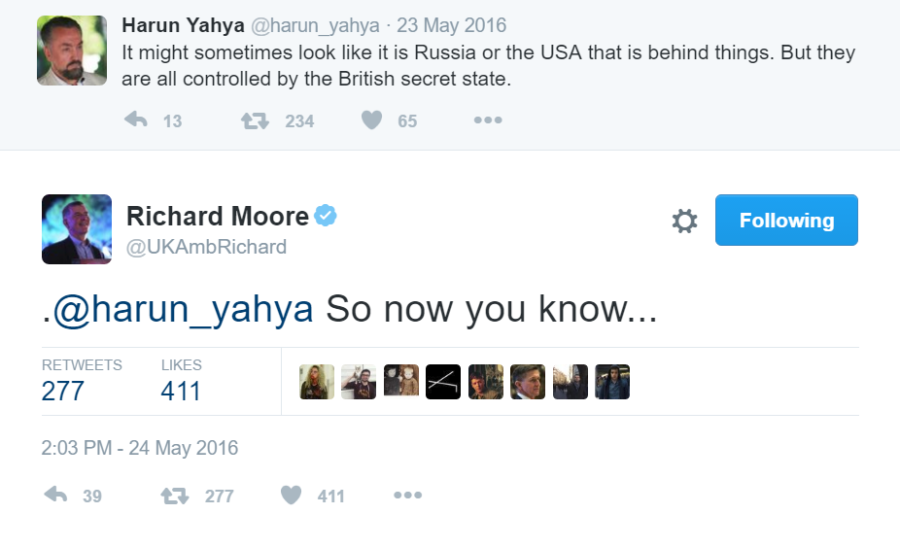
Richard’s fluency in Turkish is probably one of the most important factors that helps strengthen his connection with the Turkish public. We, the social media team, will sometimes translate messages on his behalf. But, more often, he does his own Turkish tweets. He replies in English to English-language questions and in Turkish to Turkish-language questions. Add in his long-running support (since 1990) of Besiktas football team, one of Turkey’s “big 3” football teams (plus an occasional reference to Chelsea) and you can wrap in a fanatical set of Twitter footie fans. https://twitter.com/UKAmbRichard/status/594969790181208064 ) (Translation: Chelsea is champion! Now let Besiktas be (the Champion)… )…and so they became. A photo of the Besiktas flag draped over the Residence balcony proved highly popular on Twitter!
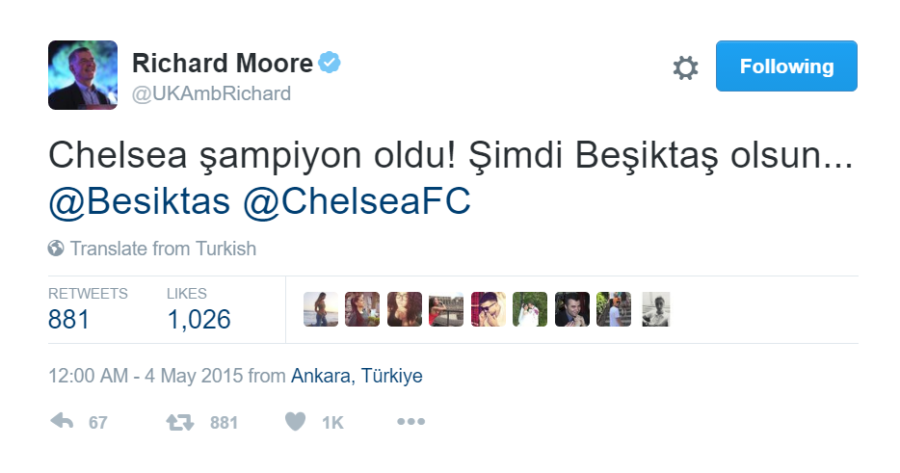
In a newspaper interview about his usage of Twitter (an example of how social media can cross usefully into mainstream media), Richard noted that “that social media is a risky environment. You get prepared very carefully for a newspaper interview, your lines are ready. But you have to be more careful on social media because you need to move more quickly. The reason I use Twitter or social media is to ensure British values and issues that are important for Britain, are understood.”
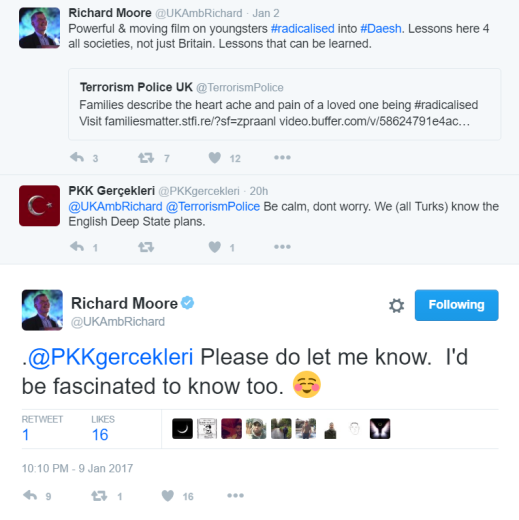
We all know that social media is a risky environment especially when it comes to sensitive political issues. But it also provides an easy and quick means to give direct information particularly when there is a risk of allowing misconstrued ideas or false facts to gain traction if you don’t respond in a timely fashion. Richard has to be prepared to take some risk if he is to turn that risk to the UK government’s advantage. In his words: “Social media, Twitter use in particular, carries risks. But I think if we are over-cautious about this as in any other aspect of diplomatic life, then you’re missing a trick! I think one of the things for which the Foreign Office deserves huge credit is that it trusts its Heads of Missions. It is important to know your facts. Yes, there are risks; you have to be careful, you have to be expert, you have to rely on a good team to fact check and do all of that. But it’s very powerful because it’s so immediate. If mistaken information or a rumour is out there, you can nail it very quickly and that’s very powerful. So it’s worth it for a bit of risk I think.”

As we mentioned earlier, Twitter and social media more generally are not just a public diplomacy tool, but also a very powerful tool during a crisis to provide consular information and advice. 15 July 2016 was a historic moment for Turkey, when the Turkish government and people were faced with a violent and bloody coup attempt in the late hours of the night. Inevitably, some British nationals in Turkey were caught up in the coup attempt (and many others were unsettled by it). A school party was stranded at Istanbul Airport. Others were in a Marmaris hotel, near where the President was staying, which was strafed by small arms and a helicopter gunship. Working with the Consular team, Richard was able to post swift responses on Twitter to numerous enquiries and so provide advice and reassurance to Brits here and to their families and friends in the UK. “If I’d been asked before if I would have expected to be tweeting during a major crisis like this, I would have said ‘You must be mad! You won’t have time.’ And people have said that to me subsequently; ‘How on earth did you have time to do this?’… And the answer is simple really: As you go into crisis mode, you allocate roles very quickly and as the Head of Mission, I was the Crisis Leader. But, by definition, the Crisis Manager is the person who is hands on and is doing most of the work and the Crisis Leader does have spare moments. You should not be fully hands on. And in those spare moments I became aware that the tweets were starting to hit my account with people in stress, worried about friends and relations in Turkey, people caught up in the situation.”
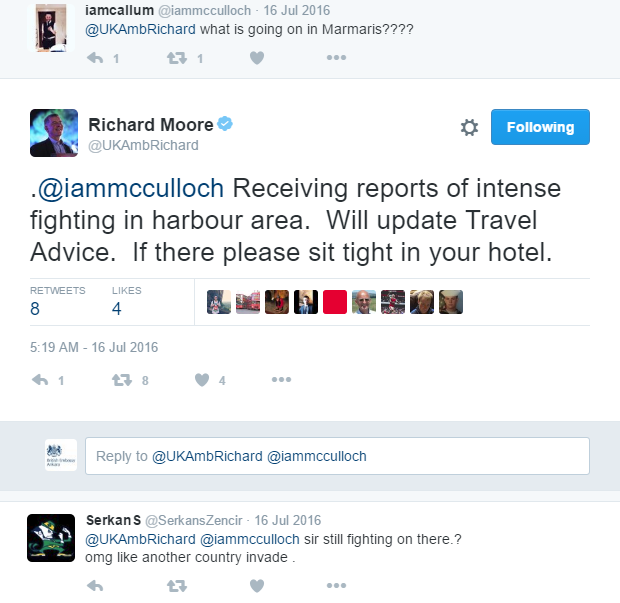
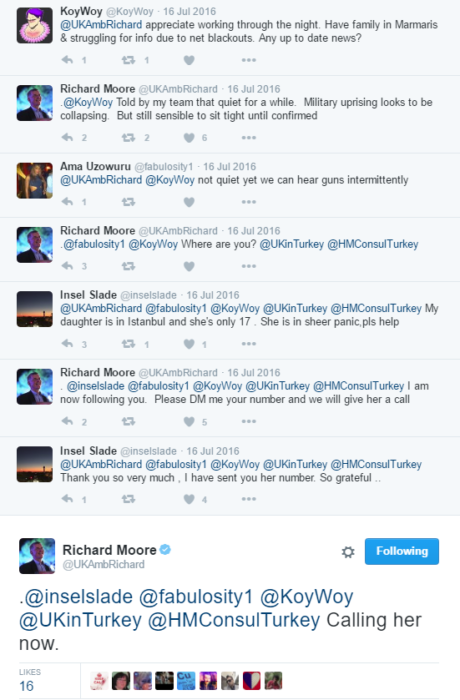
With his sense of humour, and judgement of when to counter-punch and when to ignore, Richard has now become one of the leading Twitter personalities in Turkey. Several Turkish Ministers and Presidential Advisors follow him. The key is to be recognised as authentic and “human” so you create the goodwill online to allow your messages to land more effectively. You have to also keep at it, even at its least rewarding moments when you’re being bombarded with abuse. The trick is to not take it personally. The trolls are aiming at the British Ambassador and all that he represents (in their peculiar world view) not Richard.
So not a bad old “banger”; rather an important public diplomacy vehicle which saw us go from 0-50k in three years!
No comments:
Post a Comment